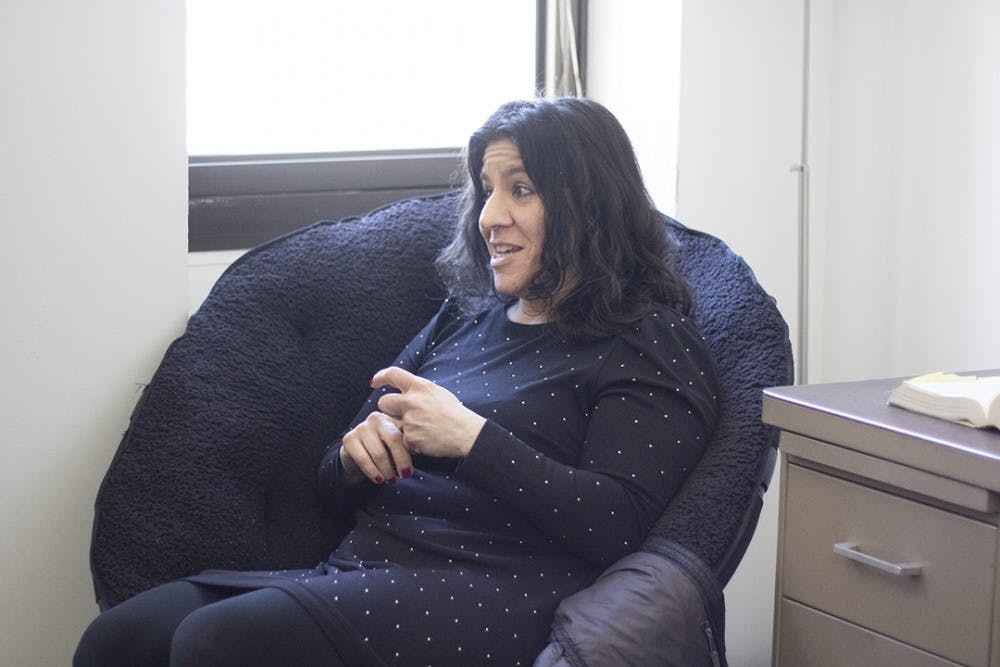When Danielle Coriale was in high school, she excelled in science. She went on to enter university as a premedical biochemistry student. Today, she is a professor of literature helping pioneer a minor in medical humanities at USC.
During her third year as a pre-med student, Coriale saw her brother study the human body in medical school. As she began to discover her love of literature through a poetry class, she realized that her brother’s path may not be the best fit for her. From this point on she devoted herself to literature, but her medical perspective has always influenced her work.
“I had all these misgivings about practicality. At the end of the day, though, I have zero regrets,” Coriale said. “My brother, he does a service in the world, but I get to do both, you know what I mean? I don’t work with the body, but I work with the ideas involved in medicine ... it's always been part of me, these questions about medicine, about science.”
Coriale was hired as an associate professor of Victorian literature and science at USC, and she began her career in the College of Arts and Sciences teaching classes on the Bronte sisters and other writers. Soon, she began to include her interests in medical science in the classroom and now teaches a contagion narrative class, combining questions of science and the arts.
“I get more satisfaction in some ways out of a course like the contagion one," Coriale said. “It's something that I have deep roots caring about, which is about health and illness and how it manifests, but I would never actually want to study how it manifests in the body. I’m more interested in how it manifests in bodies of literature.”
Coriale is currently teaching 35 students enrolled in her contagion literature course. Rachyl Jones, a second-year English student, spoke on how Coriale’s teaching has impacted her.
“I think the most interesting thing about her is how much she loves the study of disease. You don't meet too many people who are intrigued with disease and death, but to her it is absolutely fascinating,” Jones said in an email. "Because of her class, I now see the fascinating parts of disease too: the social impact, the idea of beauty, masculinity and femininity associated with disease, etc."
Third-year English student Dante Smith also attests to Coriale’s work building the contagion course and said he finds that her teaching has helped enhance his perspective.
“I feel what is most important about the work is that when analyzed, it gives, as she puts it, ‘a fuller truth,'” Smith said in an email. “We get the facts, the data, and we also get the interpretations of said events through survivor recountings, and it fleshes out the history of what really happened, but in doing so gives a richer understanding of the events surrounding the literature."
In light of student interests in interdisciplinary studies such as literature and medicine, the College of Arts and Sciences has created a medical humanities minor to assist both science and math-oriented students and liberal arts students in a holistic approach to both fields.
The minor, which encompasses multiple fields of study, including philosophy, literature, anthropology and history, aims to give interested students an interdisciplinary approach to medicine, Coriale said. Its creation process was led by Cynthia Davis, associate dean for arts, humanities and communications, who gathered together a board of faculty to discuss modernizing the curriculum of the College of Arts and Sciences. The results of this meeting included the idea of a medical humanities minor.
“It balances out maybe biochem majors, biology majors, public health majors, nursing majors,” Davis said.
Davis said that the medical humanities minor will help students prepare for the revised version of the MCAT – a standardized test medical students take.
“Fifty percent of it is on sciences, and 25 percent is on critical reading and writing skills," Davis said. "And 25 percent is on social sciences.”
Coriale described medical humanities as a search for explanation of medical ethics and questions within literature and the arts. For example, questions about pain and end of life care are often answered through the humanities.
“I think they have a sense — and I do too — that in the modern world we separate those things out," Coriale said. "Doctors learn technique, they learn structure, but they aren’t thinking about meaning or storytelling, which is crucial to medicine. It's the diagnostic tool. The encounter with a patient involves, ‘What are your symptoms?’ It's essentially a storytelling process.”
Through work in the classroom and in the administration, the medical humanities minor has been approved and will be available for students to pursue in the fall.

